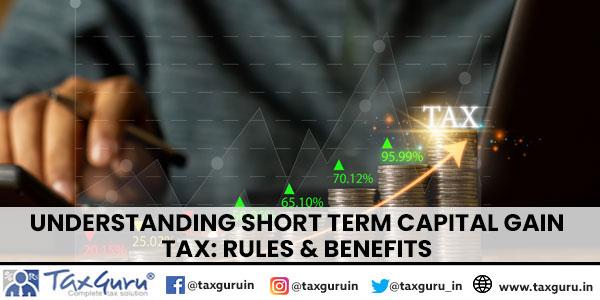Introduction: Understanding the tax implications of short-term capital gains is essential for investors in equities and equity-oriented mutual funds. Section 111A of the Income Tax Act outlines the taxation rules for such gains, offering insights into rates, exemptions, and conditions. Let’s delve deeper into these aspects.
1. Tax Calculation Under Section 111A: As per Section 111A, where total income of an assessee includes any income arising from the transfer of short-term capital asset, being equity shares in a company or unit of equity oriented mutual fund, then the tax payable shall be aggregate of –
- Tax Calculated @15% on such short-term capital gain and
- Tax payable on the balance income as it is the only income of the assessee.
Short Term Capital Gain other than referred in Section 111A shall be taxable at the normal rates applicable to the assesse.
Short Term Capital Asset: If equity shares or unit of an equity oriented mutual fund are sold within a period of 12 months from the date of purchase then it will be treated as short term capital asset.
2. Applicability of Slab Rates: In the case of Individual or HUF, being a resident, the benefit of slab rate will be available on sale of such short-term capital asset. This implies that if an individual or HUF sells such assets, they are entitled to apply the relevant slab rates for computing their tax liability.
3. Calculation Example:
To illustrate, let’s consider Mr. X, who earns a salary income of Rs. 200,000 and realizes short-term capital gains of Rs. 350,000 then tax shall be payable on
STCG – (250,000-Income other than STCG on equity shares)
Hence, STCG =350,000 – (250,000-200,000)
=300,000
Tax Payable = 45,000
This shall be increased by Health and Education Cess of 4%.

4. Rebate and Deduction Considerations:
- Section 87A provides a rebate on short-term capital gains under Section 111A, offering some relief to taxpayers.
- However, deductions under Chapter VI-A, such as 80C, 80D, and 80G, are not applicable to short-term capital gains under Section 111A.
5. Conditions for applying Section 111A
- Section 111A can be applied only if the investor holds the equity shares or unit of an equity oriented mutual fund as a capital asset not as stock in trade.
- The Transaction of Sale of such equity shares or unit of an equity oriented mutual fund should be subject to Securities Transaction Tax. There is no condition of STT paid on purchase of equity shares.
- Section 111A is not applicable to capital gains arising on buyback, open offer for sale, sale of rights entitlement, delisted shares, etc. as STT is not payable on such transactions.
Conclusion: Navigating the realm of short-term capital gains taxation necessitates a clear understanding of Section 111A’s provisions. By grasping the tax rates, exemptions, rebate opportunities, and applicable conditions, investors can optimize their tax planning strategies and make informed decisions regarding their equity investments.




